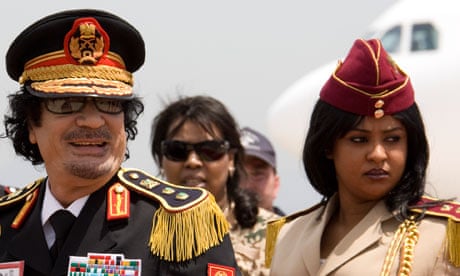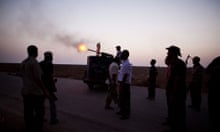In Europe they were known as the Amazons. In north Africa, they were admiringly dubbed Haris al-Has – the private guards.
They were the elite cadre of female bodyguards who surrounded Colonel Muammar Gaddafi for more than 20 years, becoming almost synonymous with his idiosyncratic dictatorial rule.
Now, nearly three weeks after Tripoli fell, the dictator's ravaged compounds are finally shedding light on the enigmatic unit. And like much else in Gaddafi's Libya, the myth of glamour and steadfast devotion is at odds with a reality of ruthless control and illusion.
Inside one building in 77 Brigade, a giant base of ruined hangars in the central city, a select group of female guards were based.
A pink petticoat in the forecourt distinguishes this two-storey heap of rubble from other more intact buildings nearby. And further inside, the shattered lives of press-ganged young women starts to emerge.
In one room, a designer desert boot lies next to a mangled wardrobe. In the next a black bra is strewn under a Mickey Mouse cutout and a blue high heel has been crushed by a timber. Further along the corridor the lighting improves, courtesy of a Nato missile that has crashed through the ceiling, and dusty wedding photos jut from a layer of concrete dust.
Down a crumbling staircase, packets of pasta spill from another ransacked room, which is now home to a cat and kittens. The building has a long-ago feel, until the last door on the left, where the reality of life in this place is both stark and recent.
This is the room of the commandant, a vehement Gaddafi loyalist named Fatima Baroud, who hasn't been seen for several months. Women who served in this unit had an abiding fear of Baroud, but were even more terrified of the small room with the rank blue carpet to the side.
"That is where I was raped," said Nisrine Gheriyanih, 19, in a prison yard this week, having been captured by the anti-Gaddafi forces. "They would come and take us by the hand and walk us down the corridor. We knew what would happen."
Several empty ointment packets lie strewn on the floor along with lentils and half eaten baguettes. Nisrine says she was assaulted here by Gaddafi's former head of internal security, Mansour Dhao, who this week fled to Niger.
But now she is facing a different plight. On the night of 20 August, as Tripoli burned, she says she was ordered by a male Gaddafi soldier to shoot dead three rebels. She said she did as she was told in order to save her own life.
"What could I do," she sobs, a rebel badge now pinned to her abaya. "If I didn't do that, I wouldn't be here now, but if I did do it, I wouldn't be here either. Which is better?"
Sitting next to her in the Jadida prison in Tripoli's east are two other women, also part of the 77 Brigade unit, known as Haris al-Shabi, with very different stories.
One, Nisrine Abdul Hadi, 19, says she was sent to join Gaddafi's army by her family in Bani Walid. She was arrested in the loyalist stronghold of Abu Selim in one of the last battles for the capital, accused of running supplies to loyalist soldiers.
She has the haunted eyes of a child who is utterly lost. "We had three jobs," she explains. "To support the male army, to do ceremonial things, like guarding. And to fight if necessary."
Sitting next to her is a rare woman in the new Libya – a diehard Gaddafi loyalist, who is happy to talk about her role as a leader of the 77 Brigade. "He gave us honour," said Jamila Calipha al-Arun, 52. "Yes I fought for him and I was proud to," she says, outlining how she carried and distributed guns to military units. "He was a good and noble man and I was proud to have served. I loved him. It was my duty. But now it's over and I want to go home."
The one area where Arun clearly differed from the ousted Libyan overlord was in how he chose his elite guard force. "You had to be tall, beautiful and have long hair," she said. "I was never chosen."
All three women sitting in the prison grounds wore conservative Islamic scarves, very unlike the female guards that Gaddafi used to travel with and often take abroad.
"They did not have the same rules," said Arun. "They were the elite girls. There were around 400 of them over 10 years."
Inside Gaddafi's Bab al-Aziziya compound, six low-set grey buildings with narrow slits for windows were where his private guards were based.
Everything here has been looted or burned in recent weeks, and finding remnants of the girls in uniform is difficult. Along with the odd garment or shoe lying on a filthy floor, newspaper clippings of Arab leaders and pop stars are still pasted to one wall.
But in every other building, it is like they were never there.
"They were the most important part of Gaddafi's world and they have probably gone with him," said Arun. "Go and find Salma Milad, Judia Sudani, Mabrouka al-Mashat or Howa Tuergi. They were all Gaddafi's ladies and ran the unit. His world revolved around them."
Coerced, abused, prominent
Muammar Gaddafi's practice of giving women prominent roles in his inner court was odds with social custom in Libya, where females remain firmly outside the establishment.
Although many were coerced and abused, some women occupied elevated positions. Gaddafi's private office was directed by Mabrouka al-Mashat, a loyalist of many years who tended to the family home and enjoyed her boss's patronage.
Howa Tuergi and Judia Sudani also played prominent roles in broader Gaddafi affairs. "If the family wanted girls for parties, or other things, either of them would arrange it," said Nisrine Gheriyani, one of the ousted tyrant's former female soldiers.
His guard force and female soldiers were very much his eyes and ears – in some ways equally important as the old-world male spy lords who enforced his police state.
"We were told to report to the family anything strange you see, or hear. Don't talk to anyone about it," said Nisrine Abdul Hadi, another guard. Maybe he trusted us more, or maybe he just liked girls."


